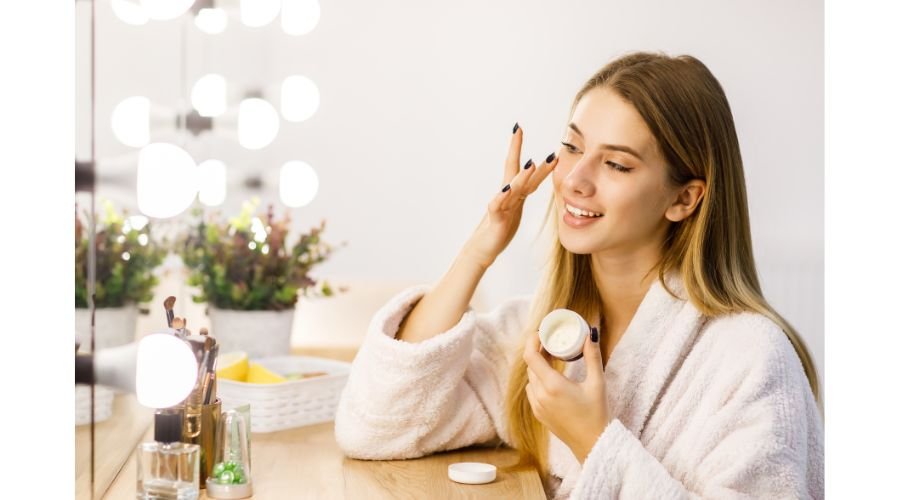The Ultimate Guide to Moisturizer For All Skin Types
Introduction
Moisturizers play a crucial role in maintaining healthy, radiant skin. Whether you’re battling dryness or aiming to achieve a dewy complexion, finding the right moisturizers can make all the difference. In this comprehensive guide, we’ll delve into the world of moisturizers, exploring their benefits, how to choose the perfect one for your skin type, application techniques, common mistakes to avoid, and much more.
Table of Contents
Understanding Moisturizers
Moisturizers are skincare products designed to hydrate and nourish the skin. They work by trapping moisture in the outer layer of the skin, preventing it from evaporating into the air. There are various types of moisturizers available, including creams, lotions, gels, and serums, each catering to different skin needs.
Benefits of Using Moisturizers
The benefits of using moisturizers extend beyond simple hydration. They help prevent dryness and flakiness, improve skin texture and appearance, and can even reduce the signs of aging by keeping the skin plump and supple.
Choosing the Right Moisturizers For All Skin Types
Selecting the right moisturizer involves considering your skin type and specific concerns. For dry skin, opt for rich, emollient formulas, while those with oily skin should look for oil-free, non-comedogenic options. Key ingredients to look for include hyaluronic acid, glycerin, and ceramides, which help lock in moisture and strengthen the skin barrier.
Application Techniques
Proper application of moisturizer is essential for optimal results. After cleansing, gently pat your skin dry and apply moisturizer while your skin is still slightly damp to lock in moisture. Massage the product in using upward, circular motions, focusing on areas prone to dryness.
Common Mistakes to Avoid
One common mistake is over-moisturizing, which can lead to clogged pores and breakouts. It’s also important to choose a moisturizer with SPF for daytime use to protect against harmful UV rays. Additionally, using the wrong type of moisturizer for your skin can exacerbate existing issues.
Natural Alternatives to Commercial Moisturizers
For those seeking natural alternatives, ingredients like coconut oil, shea butter, and aloe vera offer excellent moisturizing properties. These natural emollients provide hydration without the use of synthetic chemicals, making them ideal for sensitive skin types.
Common Mistakes to Avoid
There are several myths surrounding moisturizers, such as the belief that oily skin doesn’t need moisturizing. In reality, even oily skin types can benefit from using a lightweight, oil-free moisturizer to maintain balance and hydration.
DIY Recipes! Moisturizer For All Skin Types
If you prefer a hands-on approach, DIY moisturizer recipes are a fun and cost-effective way to pamper your skin. Simple ingredients like coconut oil, beeswax, and essential oils can be combined to create custom formulations tailored to your skin’s needs.
Moisturizers for Different Seasons
Your skin’s needs may change with the seasons, requiring adjustments to your moisturizer routine. In winter, opt for heavier, more nourishing formulas to combat dryness, while lightweight, hydrating gels are perfect for summer months.
Moisturizers for Specific Skin Concerns
There are moisturizers designed to address specific skin concerns, such as anti-aging formulations that target fine lines and wrinkles, or moisturizers formulated for acne-prone skin that help regulate oil production and prevent breakouts.
Expert Tips for Healthy Skin
Dermatologists recommend incorporating moisturizing into your daily skincare routine, along with other healthy habits like staying hydrated, eating a balanced diet, and protecting your skin from sun exposure.
Case Studies: Success Stories with Moisturizers
Real-life testimonials and before-and-after pictures showcase the transformative power of moisturizers, highlighting the positive impact they can have on various skin concerns.
The Future of Moisturizers
As skincare technology continues to advance, we can expect to see innovative new formulations that address specific skin needs and incorporate cutting-edge ingredients. Trends such as clean beauty and sustainability are also shaping the future of the skincare industry.
To know more about Moisturizers click on the Link
Conclusion
In conclusion, moisturizers are a vital component of any skincare regimen, offering hydration, nourishment, and protection for healthy, glowing skin. By understanding your skin type and choosing the right moisturizer, you can achieve the complexion of your dreams and enjoy the confidence that comes with it.
FAQs
No, even oily skin needs hydration. Look for lightweight, oil-free moisturizers to maintain balance. without clogging pores
It’s best to apply moisturizer twice daily, in the morning and evening, after cleansing.
Body moisturizers are formulated differently and may be too heavy for facial skin. It’s best to use products specifically designed for the face.
- Discontinue use and switch to a non-comedogenic moisturizer formulated for acne-prone skin.
For optimal sun protection, it’s recommended to use a moisturizer with SPF during the day, especially if you’ll be spending time outdoors.

